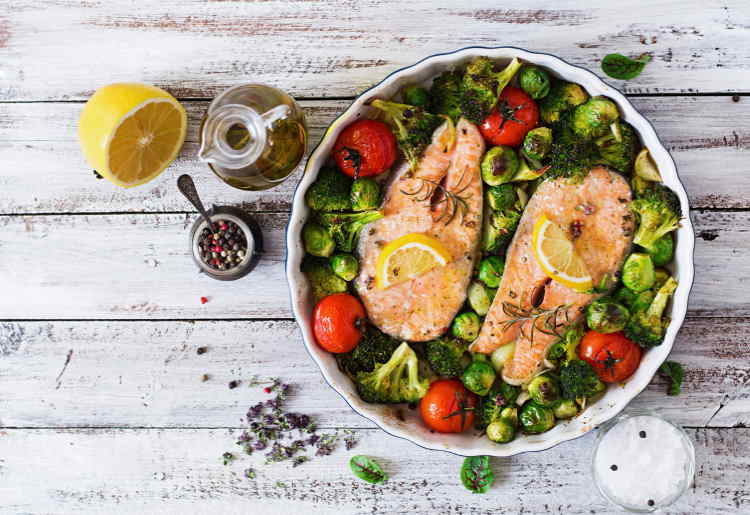- Home/
- Meal Delivery/
- A Beginner’s Guide to High-Protein Diets
A Beginner’s Guide to High-Protein Diets
June 17, 2022

June 17, 2022

Research suggests that increasing your protein levels (by eating more high-protein foods) may have significant effects on your appetite, metabolic rate, body composition and weight. Essentially, because you feel fuller when eating more protein, you eat less.
When you reduce your carbohydrates, you body begins to fuel itself with the fat and proteins you’ve ingested. There are some really well known diets that emphasise this, like Atkins and keto diets, which are also commonly referred to as low-carb diets.
If you’re looking to lose weight on a high-protein diet, avoid fatty meats and be sure to include vegetables and drink plenty of water. Choose lean meats and dairy and be sure you’re getting plenty of dietary fiber.
| Eat | Don't Eat |
|---|---|
| Meat | Sugary foods |
| Fish | Grains and starches |
| Eggs | Lots of fruit |
| Seafood | Beans and legumes |
| Quinoa | Root vegetables or tubes |
| Beans, lentils, chickpeas | Low-fat or diet products |
| Cheese, cottage cheese, Greek yogurt | Alcohol |
| Avocados | Unhealthy fats, such as processed vegetable |
| Low carb veggies, like greens, tomatoes, onions, peppers, brussels sprouts | Oil or mayo |
Option 1: Bacon, eggs, whole wheat toast with almond butter
Option 2: Salad, cottage cheese and seitan
Option 3: Full-fat yogurt with nuts
Option 1: Chicken salad with tomatoes and kale
Option 2: Canned salmon salad, mixed greens, and an apple
Option 3: Grilled chicken cutlets with avocado and hard boiled egg
Option 1: Sea bass, lentils and green beans
Option 2: Beef stir fry with quinoa
Option 3: Salmon with broccoli
Cheese, nuts, hard boiled eggs, milkshakes, full-fat yogurt, cottage cheese, peanut butter on a spoon.
There’s been a good amount of research suggesting that high-protein diets will indeed help you lose weight in the short-term. It can also keep you from gaining weight in the first place--you’ll probably eat fewer calories and burn more of them. Protein also takes a while for your body to break down, meaning sustained energy without the sugar crash you can get from quick-and-dirty carbohydrates. Your insulin levels will stabilize, leaving you with steady energy throughout the day.
Interestingly, high-protein diets are also proven to have a positive impact on hair, skin and nails. This diet is linked to beneficial effects on appetite, weight, body composition, overall health, and even aging. Yes, you might actually look younger.
There are some risks to people who are susceptible to kidney disease and kidney stones, however, and if you’re eating fatty protein you can increase your cholesterol levels and risk of heart disease. If you’re not sure how to maintain a healthy high-protein diet, don’t do it on your own. There are endless diet plan options out there, and talking to a nutritionist can’t hurt when you’re ready to overhaul your diet. Remember, this is not a no-carb diet, like keto, this is simply a reduction and an increase in the healthy proteins that are fueling your body. Fruits and veggies are an important part of maintaining your overall health and wellbeing as well, so don’t forget to add them into your meal plan. If you find yourself getting headaches or flu-like symptoms, add a few more carbs into your regime.
There’s nothing too complex about a high-protein diet unless you’ve always been a pasta fiend or PB&J connoisseur. Try to find low-fat meat options, like chicken and ham, as well as fish, seafood, and plant-based foods like chickpeas, lentils, and beans. Try to make the main portion of your meal a high-protein option, eating a minimum of 20 to 30 grams of protein in every meal. This amount of protein will keep you full and preserve muscle mass better than if you were eating smaller amounts throughout the day as snacks.
You should also try edamame, jerky, and whey protein powder. Most smoothies, for example, are high-sugar foods, but add in some whey powder, some peanut butter, or raw tahini, and you’ve got a high-protein breakfast, snack or lunch ready. Pre-made chicken, fish, hard-boiled eggs or roasted nuts made good salad toppings, enhancing a side dish into a main meal that will keep you full and satisfied. Greek yogurt has about five times as much protein as regular yogurt, so keep it in your cupboard.
Check with a nutritionist or doctor before making any drastic changes to your diet. Try your preferred method and take it slowly. Pay attention to your body. If you’re hungry, tired, or otherwise unwell, consider switching plans. Track your carbs and forget about calories; this diet is all about proportions.
From weight loss to muscle building, protein plays an important role in your body’s everyday functioning, and high-protein diets can help you lose weight without losing muscle mass. You’ll feel full longer, which will help you reduce your calorie intake, and you’ll burn more calories too. There are all kinds of apps, diet plans and protein and carb trackers you can use to make sure you’re following a healthy balance of carbs and proteins without overdoing it. You don’t need to make any huge changes. Research shows that even small increases in protein, from 15 to 18% of total daily calories) can help maintain weight loss goals, so there’s no ping-pong dieting. Be sure to use that protein by exercising, eating well, and drinking plenty of water.
Top10.com's editorial staff is a professional team of editors and writers with dozens of years of experience covering consumer, financial and business products and services.